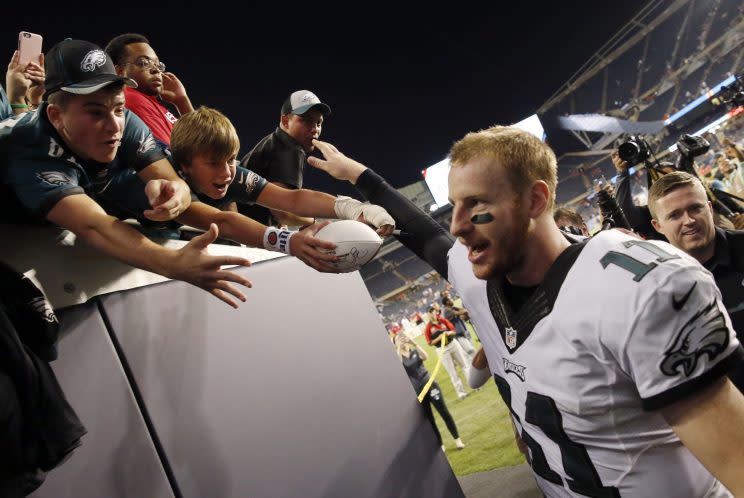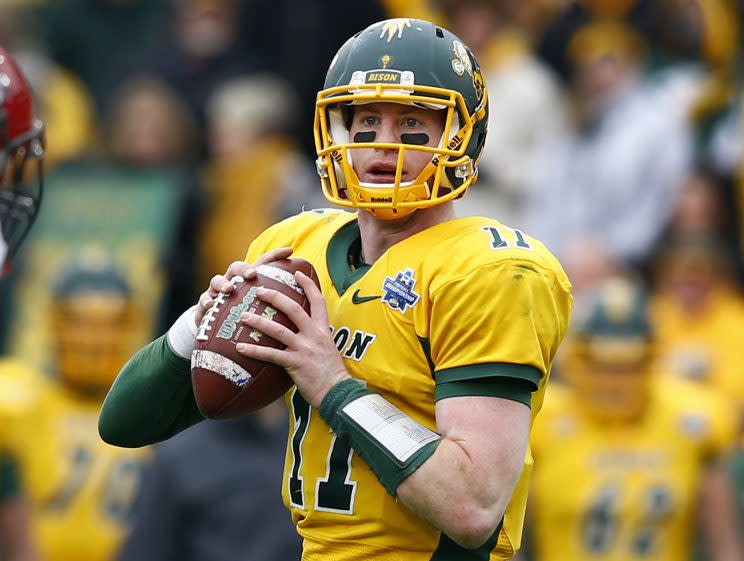Here's one explanation for Carson Wentz's statistical standing as best QB in NFL after two weeks
On Monday, you could’ve concluded that Jay Cutler was a rookie quarterback and his counterpart, Carson Wentz, was the seasoned vet.
Wentz, in his first road game as a pro and in front of the biggest hostile crowd in his life, appeared remarkably calm in a 29-14 Philadelphia Eagles victory against the Chicago Bears. He communicated early and often with his blockers and receivers, as if he didn’t need coaches to tell him what to do. He threw with little hesitation, and strong velocity even when the rush was about to drill him. Pro Football Focus rates Wentz the best quarterback in the league after two weeks.

It was a sight that’s rare in modern football: a rookie passer who seems prepared from the beginning of his first season. Part of the reason is his maturity. But part of the reason is Wentz is familiar with being in a huddle, altering plays on the fly and calling protections.
“He had complete control,” said his position coach at North Dakota State, Randy Hedberg. “He could change the play at the line. He handled all the protections at the line of scrimmage. …
“I think that’s really, really important. He changed calls from side to side. He was doing that during the course of a game. That’s something he did for us. That’s our system. That’s the way we do it.”
Hedberg says part of how North Dakota State recruits is looking for passers who can handle a lot of information at the line of scrimmage. That means winnowing down a long list of prep passers, as early as summer camps for teenagers, because there are few who can and will accept that challenge.
Bruce Feldman, who authored “The QB: The Making of the Modern Quarterback,” says fewer than 20 percent of college quarterbacks are comfortable with calling protections – even as few as 10 percent.
“They don’t know how to manage the huddle or go through a normal cadence,” Feldman says. “Usually it’s pro-style guys who don’t have to adjust as much [to the NFL], but that doesn’t mean they necessarily have the most talent.”
The pressure to win at the collegiate level creates less time for building pro-ready quarterbacks (and offensive linemen). That in turn filters down to the high school level, where the easier-to-master spread has taken hold in many states. Hedberg says it’s so rare to see another offense like NDSU’s that he has trouble knowing what a defense will do to counter the Bison.
Even that has benefited Wentz, a player who developed late but always had a thirst for knowledge about the quarterback position. He was ready to take charge of the offense when it was time. And reacting to new defenses quickly became part of the job.
Hedberg says during one practice, the Bison defenders showed a particular look and Wentz called a protection the offense hadn’t used before. “In practice he throws out that protection and he told the offensive tackle, ‘You have to carry this three-technique back.’ It was pretty special: ‘Holy cow this guy gets it.'”
Wentz has other rare qualities, of course. He’s tough – able to take a hit. He’s athletic – able to keep his shoulders on a level plane even when twisting to throw during a scramble. He’s confident – he speaks openly about his faith and he was unbothered by the entire draft process. He’s intelligent as well. So this is not merely a “system quarterback” taking the next step.
However, the system has given him a foundation that few other passers have. Even the long string of words used to call a play in the NFL is something that mirrors what NDSU does.
It’s far too soon to call Wentz a pro success (and far too soon to conclude anything about Jared Goff, who played in an “Air Raid” spread system at Cal), but it’s not too soon to wonder whether the college and high school game will ever swing back toward the kind of system NDSU runs. Teddy Bridgewater also could do a lot of pre-snap at Louisville, and it benefited him with the Vikings before his knee injury. There are other examples, of course, with Peyton Manning being the best of them. Meanwhile, the spread quarterbacks often take more time to adjust.

If he continues to succeed, Wentz will continue to be an ongoing advertisement for North Dakota State and the style of offense the Bison run. The question is whether other programs will follow. For now, the concern that Wentz didn’t face elite competition in college has dwindled mightily.
“We try to put ’em in stressful situations, whether in a meeting setting or the practice setting, so they can respond in a favorable way in a game,” Hedberg says.
That’s certainly worked with Wentz – both in Fargo and on Monday in Chicago.
More NFL coverage on Yahoo Sports:


